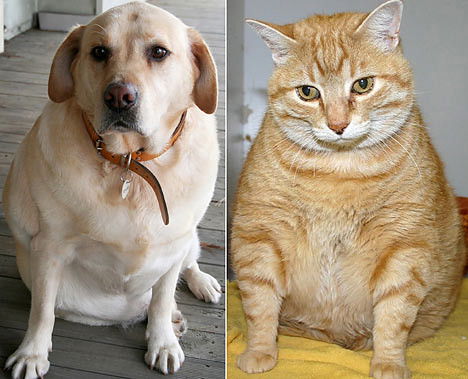4 WAYS TO HELP YOUR OVERWEIGHT PET!

According to USA Today, the majority of cats and dogs in the United States are overweight or obese – 59.5 percent of cats and 55.8 percent of dogs – a statistic that hasn't changed much in recent years according to a survey of pet owners and veterinarians. USA Today mentions that most people have tried to help their pet lose weight but have had no luck whatsoever. Health problems for pets that are overweight can hold serious consequences for you and them. Here are a few ideas to help you try to get this problem under control.
1. TOSS THE TREATS ...... in the garbage not to your pet!
This is the biggest culprit in preventing cats and dogs from shedding extra pounds is treats, they say. If you want healthier treats, look for options that have no more than 10 calories per serving. Most treats that owners give their pets are full of fat and sugar, and that makes them crave them even more.
2. CHECK THE CALORIE AND FAT CONTENT of your pet's food.
This is just as important as the ingredients when it comes to maintaining "a healthy weight" for your little (or big) cherub.
3. NEVER LEAVE PET FOOD OUT ALL DAY
a. Set a time to feed your pets. (Example; morning before you go to work and evening when you get home).
b. Be as consistent as possible.
c. Follow the feeding instructions on the bag. Some are different depending on the ingredients. (If you feed twice a day, take that into consideration in your amounts.)
d. Always leave fresh water for your pet. If they think they are hungry sometimes all they really need is a drink.
Last but definitely not least....
4. ASK YOUR VETERINARIAN
If you think your pet has a serious problem, not having this conversation is at the detriment of your pet's health. By the time you work up the courage to ask, there could already be damage or a tremendous risk of one. Don't wait! You and your pet could regret it later.